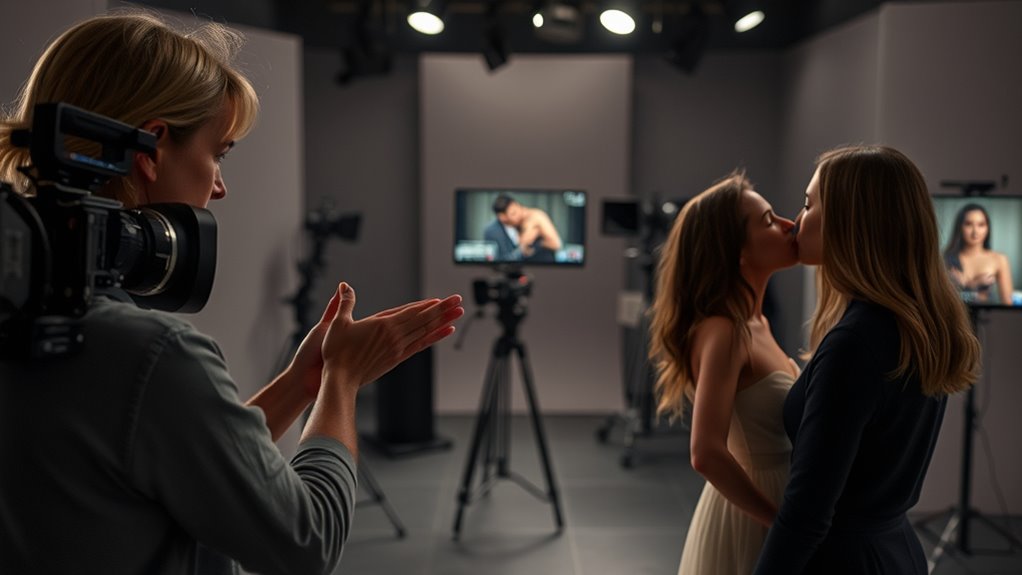Intimacy coordinators have transformed modern TV dramas by fostering safer, more respectful environments on set. They work closely with actors and directors to plan scenes carefully, prioritize consent, and guarantee realistic yet comfortable portrayals of intimacy. Industry standards now emphasize clear communication and boundaries, shifting power dynamics to give actors more agency. If you want to discover how these changes are shaping storytelling and the industry’s future, there’s more to explore ahead.
Key Takeaways
- Intimacy coordinators establish clear communication, consent, and boundaries, creating a safer, more respectful environment for actors during intimate scenes.
- They collaborate with costume and set designers to ensure wardrobe and environments support comfort and realism.
- Their involvement enhances emotional authenticity, allowing actors to perform more naturally while maintaining safety.
- Industry standards now emphasize consent protocols, ongoing check-ins, and confidentiality, transforming traditional production practices.
- The role has improved on-set dynamics, increased actor control, and elevated audience perception of genuine, respectful portrayals of intimacy.
The Rise of Intimacy Coordinators in TV Production

The role of intimacy coordinators has rapidly gained prominence in TV production, transforming how scenes involving intimacy are handled on set. You’ll notice they work closely with costume designers to ensure wardrobe choices support comfort and realism, avoiding unnecessary exposure. They also collaborate with set decorators to create environments that facilitate smooth, respectful scenes, minimizing awkwardness. By coordinating these elements, they help set a professional tone, allowing actors to focus on their performances. Their presence has shifted production dynamics, emphasizing consent and clarity from the beginning. This integrated approach guarantees scenes are authentic while respecting everyone’s boundaries. As a result, intimacy coordinators have become essential in fostering a safe, respectful atmosphere on set, redefining modern TV storytelling.
Ensuring Actor Safety and Comfort on Set

Because actor safety and comfort are top priorities, intimacy coordinators actively create a supportive environment on set. They ensure emotional intimacy is handled with sensitivity, making sure actors feel safe expressing vulnerability. Setting clear physical boundaries helps prevent discomfort or overstepping during scenes, so everyone knows what’s acceptable. You’re guided through open conversations about what feels right, allowing you to voice concerns without fear. The coordinator’s role is to foster trust, making sure scenes are performed respectfully and consensually. They’re present during rehearsals and filming, monitoring body language and reactions to prevent any unintended harm. By prioritizing emotional intimacy and respecting physical boundaries, they help create a space where you can perform authentically without compromising your safety or comfort. Additionally, understanding projector technology can aid in creating a comfortable and visually appealing environment that supports your performance.
Developing Choreography for Sensitive Scenes

When developing choreography for sensitive scenes, you focus on ensuring everyone’s consent and comfort first. Precise movement coordination helps create realistic portrayals while respecting boundaries. This approach keeps actors safe and the scene authentic.
Consent and Comfort Measures
Creating choreography for sensitive scenes requires careful planning to guarantee everyone’s consent and comfort. You start by discussing intimacy boundaries openly with actors, ensuring they know their limits and feel safe. Respecting actor boundaries is essential; you check in regularly and encourage honest communication throughout the process. Using clear language, you outline the scene’s scope, allowing actors to voice concerns or request adjustments. Consent is an ongoing process, not a one-time agreement. You collaborate with actors and directors to develop a plan that prioritizes comfort without compromising storytelling. By establishing trust and maintaining transparency, you help create a safe environment where actors can perform authentically while feeling protected. Additionally, incorporating appropriate staging and choreography can help minimize physical contact and maintain professionalism on set. This approach ensures sensitive scenes are handled with professionalism and care.
Precise Movement Coordination
Developing choreography for sensitive scenes requires meticulous attention to movement details to guarantee actors’ safety and comfort. You carefully plan camera angles to minimize awkwardness and maintain intimacy without revealing more than necessary. Lighting techniques play a vital role, highlighting actors’ expressions while concealing any uncomfortable positions. You coordinate precise movements, ensuring each step flows seamlessly, reducing the risk of accidental contact or miscommunication. Every gesture, turn, and pause is deliberate, designed to create a sense of realism while respecting boundaries. By aligning camera angles and lighting with choreography, you craft a scene that feels authentic yet safe. This meticulous approach allows actors to perform confidently, knowing their comfort is prioritized without sacrificing the scene’s emotional impact.
Shifting Power Dynamics and Actor Agency

As intimacy coordinators become integral to TV productions, they have shifted the power balance between actors and directors. This change enhances actor agency, allowing performers to voice boundaries confidently. You now see a more collaborative environment where actors feel empowered to speak up without fear of retribution. The influence of intimacy coordinators helps redefine traditional power dynamics, ensuring everyone’s comfort and consent are prioritized. Consider these key impacts:
- Actors gain greater control over their scenes and boundaries
- Directors adopt a more consultative approach to scene planning
- Power is redistributed to foster mutual respect
- Actor agency is reinforced through clear communication and protocols
- Incorporating mindful decluttering strategies can help create a more focused and respectful workspace, reducing unnecessary stress and distractions.
This evolution fosters a safer, more respectful working environment, fundamentally transforming how TV dramas are produced.
Impact on Scriptwriting and Scene Execution

You’ll notice that scripts now focus more on authenticity and emotional truth, thanks to intimacy coordinators guiding scene details. This shift encourages writers to craft dialogue that feels respectful and real, making scenes more believable. As a result, scene execution becomes smoother, with actors and directors working together to bring these moments to life responsibly. Additionally, the integration of privacy and cookie considerations ensures that the production process remains transparent and respectful of all participants.
Authenticity in Scripts
Have you ever noticed how modern TV dramas often feel more genuine and relatable? This shift stems from greater emphasis on authenticity in scripts, driven by intimacy coordinators. They help challenge intimacy myths, ensuring scenes reflect real emotions without sensationalism. You now see scripts that prioritize emotional authenticity, making interactions feel sincere. This influences how writers craft dialogue and develop characters, aiming for honesty over cliché. Additionally, the collaboration between writers and intimacy coordinators often involves self-awareness, which helps create more nuanced and believable portrayals.
Enhancing Scene Realism
Authenticity in scripts has transformed the way scenes are written, encouraging you to craft scenarios that feel more believable and emotionally resonant. Intimacy coordinators help elevate this realism by guiding actors through emotionally charged moments, making scenes more authentic. Their involvement ensures that physical interactions align with the emotional tone, enhancing visual storytelling. This collaboration influences scriptwriting, prompting writers to create scenarios that naturally accommodate the actors’ comfort and emotional stakes. Furthermore, vetted techniques employed by coordinators foster a safe environment, allowing for genuine performances that resonate with viewers.
Respectful Dialogue Crafting
Respectful dialogue crafting has become essential in modern TV drama, especially with the influence of intimacy coordinators guiding scene development. You now prioritize authentic, considerate conversations that reflect characters’ emotions and cultural backgrounds. This approach enhances audience engagement by fostering believable interactions and respecting diverse perspectives. To achieve this, you focus on:
- Using inclusive language that respects cultural representation
- Avoiding stereotypes or offensive phrasing
- Ensuring dialogue aligns with characters’ personalities and contexts
- Promoting open communication among writers, actors, and coordinators
- Regularly reviewing scripts for cultural sensitivity to ensure respectful portrayal
Promoting Consent and Respect Through Industry Standards

As industry standards evolve, intimacy coordinators play a pivotal role in ensuring that consent and respect are prioritized on set. They help establish clear protocols that safeguard performers’ well-being and foster a professional environment. This commitment influences industry training, ensuring everyone understands the importance of boundaries. It also impacts audience reception, as viewers notice more authentic and respectful portrayals. To promote transparency, many productions adopt standardized practices:
| Standard | Purpose | Implementation |
|---|---|---|
| Consent Checks | Ensure ongoing agreement | Pre-shoot discussions |
| Clear Communication | Prevent misunderstandings | Open dialogue protocols |
| Boundaries Setting | Respect performers’ limits | Detailed scene planning |
| Confidentiality | Protect privacy | Confidentiality agreements |
| Feedback Channels | Address concerns | Regular check-ins |
These standards embed respect into every aspect of production, elevating the industry’s integrity and emphasizing the importance of content protection and consent management.
Challenges and Criticisms of the Role

While intimacy coordinators have made significant strides in improving on-set dynamics, their role still faces notable challenges and criticisms. Ethical dilemmas often arise, such as balancing actors’ comfort with creative demands, which can lead to difficult decisions. Industry resistance remains a barrier, with some producers viewing coordinators as unnecessary or intrusive, hindering widespread adoption. You might also encounter concerns about overregulation stifling spontaneity and authentic performances. Additionally, there’s debate over the boundaries of the coordinator’s authority and the potential for conflicts of interest. These issues can create tension between safeguarding actors’ well-being and meeting production goals. The integration of sound recording techniques and equipment into production processes could also help address some of these challenges by ensuring clearer communication and better documentation of consent. Despite progress, maneuvering these complexities continues to test the integration of intimacy coordinators into the fabric of TV and film production.
Future Trends in Portraying Intimacy on Screen

Looking ahead, the portrayal of intimacy on screen is poised to evolve through technological innovations and shifting industry standards. You’ll see increased use of virtual reality and motion capture to create more authentic scenes while maintaining digital ethics. These tools will help protect actors and preserve integrity, influencing audience perception positively. As the industry adopts these advancements, transparency about digital techniques will become essential, shaping viewers’ trust. Consider this table:
| Technology | Impact | Audience Perception |
|---|---|---|
| Virtual Reality | More immersive, realistic scenes | Trust in authenticity increases |
| Motion Capture | Safer, controlled intimacy portrayal | Greater acceptance of digital edits |
| Digital Ethics | Ensures respectful, ethical practices | Builds viewer confidence |
Ultimately, responsible innovation will redefine intimacy’s visual language, with AI Security playing a vital role in safeguarding digital content integrity and ethical standards.
Frequently Asked Questions
How Do Intimacy Coordinators Influence Script Development and Scene Approval?
You might not realize it, but intimacy coordinators play a key role in script development and scene approval. They facilitate consent negotiations, ensuring actors feel safe and respected. During scene planning, they collaborate with directors and writers to adapt scenes for comfort and realism, making sure everyone agrees before filming begins. This process helps create authentic moments while prioritizing safety, ultimately shaping the way intimate scenes are crafted on set.
What Training or Qualifications Are Required to Become an Intimacy Coordinator?
Like a skilled navigator, you need the right tools to guide scenes safely. To become an intimacy coordinator, you should pursue certification programs and develop professional qualifications in areas like acting, dance, or theater. Many trainers offer specialized courses that cover consent, choreography, and emotional safety. These certifications help you demonstrate expertise and build trust, ensuring you’re prepared to handle intimate scenes with sensitivity and professionalism.
How Do Intimacy Coordinators Handle Disagreements Between Actors and Directors?
When disagreements arise between actors and directors, intimacy coordinators use mediation strategies to facilitate conflict resolution. You’ll find them actively listening, clarifying concerns, and promoting open dialogue. They mediate to confirm everyone feels heard and respected, balancing creative vision with actors’ comfort. By applying these conflict resolution techniques, intimacy coordinators help maintain a collaborative environment, ultimately ensuring the scene’s integrity while respecting all parties’ boundaries.
Are There Industry-Wide Standards for Intimacy Choreography and Safety Protocols?
You might think there are universal industry standards for intimacy choreography and safety protocols, but the reality is more complex. While some industry regulations and safety guidelines exist, they vary widely across productions and regions. Many organizations are now pushing for standardized protocols to safeguard actors and ensure consistent practices, but full industry-wide standards still haven’t been fully established. This leaves room for improvement and greater oversight.
How Do Actors Typically Feel About Working With Intimacy Coordinators?
You’ll likely find that actors appreciate working with intimacy coordinators because they prioritize your comfort and emotional safety. These professionals create a safe environment, helping you feel more secure during intimate scenes. Many actors report increased confidence and trust, knowing their boundaries are respected. Overall, working with an intimacy coordinator enhances your experience, making it easier to perform authentically while maintaining your emotional safety.
Conclusion
Think of intimacy coordinators as the bridge builders of modern TV—carefully designing pathways that connect actors’ comfort with compelling storytelling. When I saw a scene where actors confidently navigated a sensitive moment, I realized how these professionals transform a shaky tightrope into a sturdy bridge. Their work guarantees everyone feels safe to perform authentically, turning what used to be risky leaps into steady steps forward, shaping a more respectful and innovative future for television.









